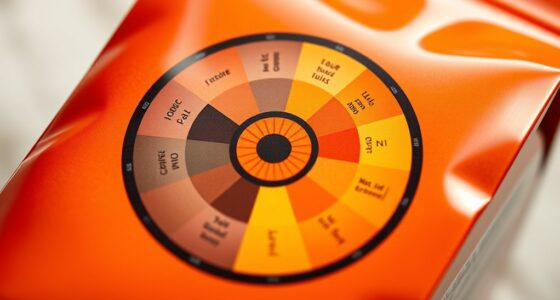Did you know coffee’s roots trace back to 9th-century Ethiopia, where goats inspired its discovery? Coffeehouses once sparked political debates in the Ottoman Empire, and Brazil now leads global production, supplying over a third of the world’s coffee. Light roasts hold more caffeine, while dark roasts develop bolder flavors. From recycling coffee waste into eco-friendly products to its historic bans, there’s much more to uncover about this energizing beverage and its worldwide influence.
Key Takeaways
- Coffee beans are actually seeds from cherries, not true beans like legumes or grains.
- The first coffee house, Kiva Han, opened in Istanbul around 1475 and became a hub for intellectual exchange.
- Robusta beans generally contain more caffeine than Arabica, influencing coffee’s strength and flavor profile.
- Coffee faced historic bans, including in Mecca and Europe, due to social and political concerns.
- Coffee waste can be upcycled into products like flour and biofuels, showcasing innovation in sustainability.

Coffee isn’t just a morning pick-me-up; it’s a beverage with a fascinating history and surprising facts that might change the way you see your favorite brew. Did you know that coffee beans are actually seeds from berries on the coffee plant? These cherries, which resemble small red or yellow fruits, contain two seeds—the coffee beans you grind and brew.
Coffee beans are actually seeds from colorful berries on the coffee plant, not true beans.
The story of coffee’s discovery traces back to 9th-century Ethiopian goat herders who noticed their goats frolicking energetically after munching on the cherries. This lively behavior caught their attention, and soon, people realized these beans could be brewed into a stimulating drink.
The world’s first coffee house, Kiva Han, opened in Istanbul around 1475, becoming a hub for intellectuals, poets, and political debates. Interestingly, coffee’s popularity wasn’t always smooth sailing; it faced repeated bans. Mecca prohibited it in 1511, fearing it encouraged dissent, while the Catholic Church and Swedish authorities in the 16th and 18th centuries also tried to ban or restrict its consumption, considering it a dangerous drug or a threat to social order.
Despite these efforts, coffee’s appeal persisted, earning the nickname “concentrated sunshine” from scientist Alexander von Humboldt, highlighting its energizing properties.
On the production side, Brazil dominates as the largest global supplier, producing about one-third of all coffee. In 2021, Brazil exported over 16.7 million bags, with South America shipping out a total of nearly 23.3 million. Vietnam follows as the second-largest producer, contributing substantially to the world’s supply.
Today, coffee isn’t just enjoyed in cafes; it’s a worldwide industry. Starbucks, for example, operates over 30,000 stores across more than 75 countries, with China emerging as its second-largest market.
Caffeine content varies based on roast level and bean type. Light roasts tend to retain more caffeine than dark roasts, which develop bolder flavors through longer, hotter roasting. Surprisingly, lighter roasts also have higher acidity, while darker ones are smoother and less acidic.
The caffeine content also depends on whether the beans are Arabica or Robusta, with Robusta generally containing more caffeine. Decaffeinated coffee removes over 97% of caffeine through chemical or solvent methods, offering a caffeine-free option without sacrificing flavor.
Throughout history, coffee has influenced culture and society. Coffeehouses in the Ottoman Empire became centers of political discussion, and even Swedish King Gustave III once tested coffee’s toxicity on prisoners.
Today, coffee continues to be a social glue, with modern cafes serving as communal spaces. From ancient myths—like Kaldi’s dancing goats—to modern innovations like upcycling coffee waste into flour and biofuels, coffee’s story is rich and surprising.
As the industry evolves, specialty coffee, climate-resistant varieties, and global festivals keep the culture vibrant and innovative, proving that coffee’s influence extends far beyond your morning cup.
Frequently Asked Questions
Can Coffee Help Improve Athletic Performance?
Yes, coffee can help improve your athletic performance. It contains caffeine, which boosts endurance, reduces fatigue, and enhances muscle strength.
Consuming coffee before or during exercise can help you perform longer and more effectively, especially in endurance activities.
Just keep in mind individual sensitivity and avoid drinking too close to bedtime to prevent sleep issues.
Does Coffee Affect Long-Term Brain Health?
You wonder if coffee affects long-term brain health, and the answer is yes, it does. Moderate coffee intake can help reduce risks of cognitive decline, Alzheimer’s, and Parkinson’s, while boosting neural efficiency and alertness.
But too much may harm, increasing dementia risk and gray matter loss. So, enjoy coffee in moderation to support your brain’s health, balancing benefits with potential risks for a healthier mind long-term.
Are There Any Coffee Varieties With Unique Health Benefits?
You might wonder if any coffee varieties offer unique health benefits. Yes, different types do.
For example, light roasts retain higher chlorogenic acids, providing potent antioxidants. Cold brew offers smoother caffeine absorption with still some health perks. Espresso concentrates polyphenols, supporting vascular health, while green coffee beans help regulate blood sugar.
Drinking a mix of these can boost your antioxidant intake, improve metabolism, and support overall health, making your coffee routine even more beneficial.
How Does Coffee Influence Mental Alertness Beyond Caffeine?
Coffee turbocharges your mental alertness far beyond caffeine alone. It reduces your default mode network, sharpening focus while boosting your visual and executive control networks, making you more alert and ready for action.
The aroma, taste, and ritual create a powerful psychological boost, amplifying cognition. Unlike caffeine-only drinks, coffee’s multi-network effects make you faster, sharper, and more prepared, transforming your brain into an unstoppable, high-performance machine.
Can Coffee Consumption Impact Skin Health or Aging?
You mightn’t realize that coffee can impact your skin health and aging. Drinking too much caffeine causes dehydration, leading to dry, flaky skin, and can make wrinkles more noticeable.
It may also increase inflammation, redness, and breakouts, and worsen skin conditions like rosacea or eczema. To protect your skin, enjoy coffee in moderation, stay hydrated, and maintain a nutrient-rich diet to support youthful, healthy skin.
Conclusion
Now that you’ve uncovered these surprising coffee facts, imagine what else remains hidden in your favorite brew. Could that morning cup hold secrets beyond flavor and aroma? As you sip tomorrow’s coffee, keep an eye out—you never know what fascinating surprises might be waiting to awaken your curiosity. The world of coffee is full of mysteries just waiting for you to explore. Are you ready to discover what’s next?









